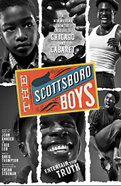What’s Up, John Kander? The Legendary Composer Talks Scottsboro Boys, Cabaret and Liza
Few men have left their mark on Broadway quite like composer John Kander. Alongside the late lyricist Fred Ebb, Kander created some of Broadway’s most popular and iconic musicals, including Chicago and Cabaret. He’s won three Tony Awards, two Grammys and two Emmys, the latter of which resulted from his longtime collaboration with Liza Minnelli. Kander's music is now back on Broadway as The Scottsboro Boys readies for an October 31 opening. The musical, which tells the true story of nine young African Americans falsely accused of rape in 1920s Alabama, is performed in the minstrel show format and marks the final collaboration between Kander and Ebb before Ebb’s 2004 death. Broadway.com snuck down to the basement of the Lyceum Theatre with Kander during a Scottsboro rehearsal break to talk to the 83-year-old composer about his lengthy career and the social importance of his latest work.
Why did you decide to create The Scottsboro Boys in the minstrel style?
It was because of the story we were telling. It’s a story with lots of characters that takes place over many years. That’s hard to tell in a straight theatrical form, but once we stumbled upon the minstrel show form it opened up everything. In a minstrel show you could have the whole company sing, there’d be individual songs and cakewalks, stories can jump all over the place…that gave us the freedom to do something not so linear. At the time these guys were arrested, there were still lots of minstrel shows. I saw several as a kid and even put one together at camp, but they’re unabashedly racist. The demeaning nature of these shows becomes a perfect metaphor for the way these guys were treated.
Was there any concern audiences might not understand the metaphor and just find it off-putting?
That’s certainly not our intention. We had a problem like that in Cabaret with the gorilla song [“If You Could See Her”] in that no matter how clearly we were satirizing anti-Semitism, people thought we were saying Jews were gorillas. I think anybody with half a mind would look at this and realize our use of the minstrel show is very much a story of oppression. When we first started, we were very curious about how a black cast would feel about it, and they all got it right away.
Did this unsettling material take its toll on you while writing?
It’s just as much fun to write about unhappy things. I mean, we wrote about Nazis and people in prison cells in South America! The subject matter doesn’t necessarily make writing easier or harder. Fred and I always took pleasure in writing seductively about things that are really awful so people suddenly realize they’re having a good time at the expense of others. Like we did “Tomorrow Belongs to Me,” [from Cabaret] in two sections. There’s one really sweet version where the audience thinks “Oh isn’t this wonderful,” and then you realize later it’s a Nazi anthem. There are songs in [Scottsboro Boys] where your toes start tapping and you think, “Those guys are having a great time.” Then you realize what the songs are really about. Sometimes you can make people think about things before they’ve realized they’ve been trapped.
Was it difficult to continue crafting the piece after Fred Ebb’s passing?
I cursed him every day I worked on this: “Where the fuck are you?” [laughs] but I’ve done the best I can to try and channel him. His spirit is very much here. The more I found myself writing lyrics, the more confidence I got. With a lot of support from [book writer David Thompson] and [director/choreographer Susan Stroman] I realized I didn’t have to be as fast as Fred.
Are you seeking other lyricists for new projects?
I have no illusions of myself being a great lyricist [laughs]. I’m working on a tiny project with a young guy named Greg Pierce. It’s a piece with three short stories featuring four actors and three instruments. It’s so small you could do it in your living room.
Last season only two musicals were eligible for the Tony Award for Best Score. As one of Broadway’s most legendary composers, what are your opinion on Broadway’s current state?
But this season is so different! Every time pundits say nobody’s writing new musicals anymore, suddenly the next year there’s a ton. There’s a lot of terrific talent around: Lin-Manuel Miranda, Tom Kitt, Michael Friedman, David Yazbek… it’s just a matter of if the economics of theater and the critics don’t manage to drown them.
The Chicago revival is nearing its 14th year. Are there any of your other shows you’d like to see revived soon?
All of them! There’s a possibility of Zorba next year. I would love to see a New York production of The Visit, which we did in Washington and Chicago, same with Skin of Our Teeth, which we unfortunately lost the rights to. I don’t think about other past shows as much as I think about what I want to write next, though.
Earlier this year the Frank Sinatra musical, Come Fly Away, featured a big finish set to your classic song “(Theme From) New York, New York.” Whose version do you feel is the definitive, Sinatra or Liza Minnelli?
Oh Liza’s! She sang it the way it was written. I’m very grateful for the song’s popularity due to Frank, but we wrote it for her. Fred would’ve said the same.
Looking back at your extensive career, what do you feel is the highlight?
This, right now. [Stroman, Thompson] and I all found ourselves saying to the company in rehearsal that this has been the most intense and fulfilling experience we’ve had in the theater. We really mean that. I think these men and their story really matters.
